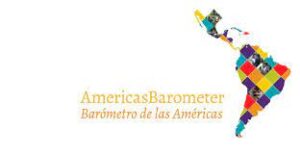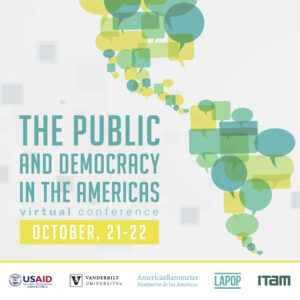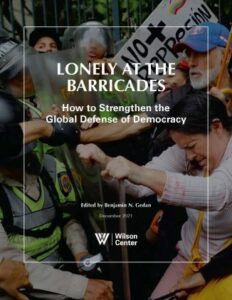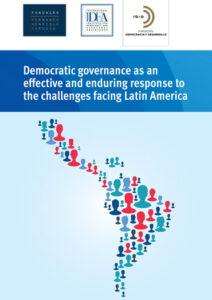 The COVID pandemic has put tremendous strain on Latin American citizens and governments, testing the resilience of democracy. The good news coming from valuable new survey data is that the majority of citizens continue to support democracy. Nevertheless, many express dissatisfaction with its economic and social outcomes and particularly mistrust elections, notes Razvan Vlaicu, a senior research economist at the Inter-American Development Bank’s Research Department:
The COVID pandemic has put tremendous strain on Latin American citizens and governments, testing the resilience of democracy. The good news coming from valuable new survey data is that the majority of citizens continue to support democracy. Nevertheless, many express dissatisfaction with its economic and social outcomes and particularly mistrust elections, notes Razvan Vlaicu, a senior research economist at the Inter-American Development Bank’s Research Department:
Trust in government institutions and the political process is key to economic growth and development in the region, according to the forthcoming IDB Development in the Americas flagship report. In the face of challenging circumstances, political leaders need to safeguard public trust by providing economic opportunities and upholding the rule of law. The survey has other interesting findings, covering areas like corruption, crime, and migration. These are discussed in detail in LAPOP’s Pulse of Democracy report.
Overall, the message seems to be clear: Citizens in Latin America and the Caribbean want economic stability, fair elections, and the protection of basic rights, Vlaicu concludes.
 From authoritarian entrenchment and persistent corruption to widespread human-rights abuses, the democratic ecosystem throughout Latin America is fragile, according to a recent Atlantic Council analysis.
From authoritarian entrenchment and persistent corruption to widespread human-rights abuses, the democratic ecosystem throughout Latin America is fragile, according to a recent Atlantic Council analysis.
The Summit for Democracy and the Ninth Summit of the Americas provide necessary platforms to highlight the importance of dealing with authoritarianism, corrupt practices, and human-rights infringements, note Eguiar Lizundia and Antonio Garrastazu, deputy director for technical advancement at the International Republican Institute (IRI) and IRI’s regional LAC director, respectively. But ensuring that the commitments become a reality will require an alliance of willing democracies and Latin American civil society—whose advocacy during and after the two events will be critical to catalyze a multi-stakeholder coalition that can put pressure on the governments of the region to deliver.
There is a lot of fighting back against the authoritarian trends across the region, said Miriam Kornblith, senior director for Latin America and the Caribbean at the National Endowment for Democracy (NED).
 Even in the case of Cuba, for the first time in 60 years, people took to the streets, she told PBS Newshour. There’s a very vibrant civil society in Latin America that is fighting back. They are looking for transparency, anti-corruption. They’re looking for rule of law, for independent judiciary, for independent legislative branches. There are lots of courageous, innovative and very committed people fighting back, said Kornblith, a contributor to a new Wilson Center report, Lonely at the Barricades: How to Strengthen the Global Defense of Democracy.
Even in the case of Cuba, for the first time in 60 years, people took to the streets, she told PBS Newshour. There’s a very vibrant civil society in Latin America that is fighting back. They are looking for transparency, anti-corruption. They’re looking for rule of law, for independent judiciary, for independent legislative branches. There are lots of courageous, innovative and very committed people fighting back, said Kornblith, a contributor to a new Wilson Center report, Lonely at the Barricades: How to Strengthen the Global Defense of Democracy.
Many extraordinary Latin American voices were heard at the Summit for Democracy, addressing the overarching themes of reversing democratic backsliding, combating corrosive corruption, and defending human rights, adds Richard E. Feinberg, a principal architect of the first Summit of the Americas in 1994. While the kleptocrats of Honduras were not invited, Jennifer Avila Reyes (see below), a brave Honduran journalist, was.
The Summit for Democracy set the stage for the regional IX Summit of the Americas, scheduled for mid-2022, he writes for Global Americans:
It now seems likely that the United States, as host, will not invite Cuba and Nicaragua, and will turn to the exiled Guaidó to represent Venezuela. But even if present, the three most populous Latin American nations—Argentina, Brazil, and Mexico—will likely resist U.S. entreaties on key summit themes. The United States will, again, be obliged to turn to credible civil society and business leaders, with those remaining capable copacetic governments, to build coalitions of the willing to drive forward mutually agreed-upon initiatives.
 The challenges to democracy in Latin America are the subject of a keynote address by the University of Chicago’s James A. Robinson, co-author of Why Nations Fail and The Narrow Corridor: States, Societies, and the Fate of Liberty, at the XXXII Annual Research Seminar of Peru’s Consorcio de Investigación Económica y Social (CIES). Martin Tanaka from the Instituto de Estudios Peruanos, and Peru’s Minister of Economy and Finance Pedro Francke provide commentary in a session moderated by Fabiola Córdoba, associate director for Latin America and the Caribbean at the National Endowment for Democracy (NED). 17 December 2021. 11:55 a.m. – 1:15 p.m. RSVP
The challenges to democracy in Latin America are the subject of a keynote address by the University of Chicago’s James A. Robinson, co-author of Why Nations Fail and The Narrow Corridor: States, Societies, and the Fate of Liberty, at the XXXII Annual Research Seminar of Peru’s Consorcio de Investigación Económica y Social (CIES). Martin Tanaka from the Instituto de Estudios Peruanos, and Peru’s Minister of Economy and Finance Pedro Francke provide commentary in a session moderated by Fabiola Córdoba, associate director for Latin America and the Caribbean at the National Endowment for Democracy (NED). 17 December 2021. 11:55 a.m. – 1:15 p.m. RSVP
As we turn the corner to 2022, democracy in the Americas is arguably less secure than when the Inter-American Democratic Charter was signed in 2001, AS/COA adds. Two countries—Nicaragua and Venezuela—can no longer plausibly be considered democratic, while El Salvador, Haiti, and others are in various stages of democratic decay. The next edition of the #DemocracyDialogues will feature a conversation with Ambassador Arturo Sarukhan, a keen observer of democratic institutions and governance within North America and across Latin America, for a discussion of the state of democracy in the Americas with a special focus on Mexico. 11:00 a.m. to 11:30 a.m. RSVP







